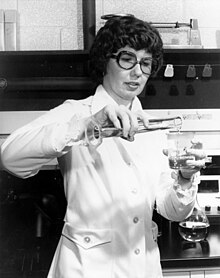
Back فلسفة نسوية للعلم Arabic বিজ্ঞানৰ নাৰীবাদী দৰ্শন Assamese নারীবাদী বিজ্ঞানদর্শন Bengali/Bangla Feministische Wissenschaftstheorie German فلسفه علم فمینیستی Persian Philosophie féministe des sciences French Феминистичка филозофија науке Serbian Feministisk vetenskapsteori Swedish
| Part of a series on |
| Feminist philosophy |
|---|
 |
Feminist philosophy of science is a branch of feminist philosophy that seeks to understand how the acquirement of knowledge through scientific means has been influenced by notions of gender identity and gender roles in society. Feminist philosophers of science question how scientific research and scientific knowledge itself may be influenced and possibly compromised by the social and professional framework within which that research and knowledge is established and exists. The intersection of gender and science allows feminist philosophers to reexamine fundamental questions and truths in the field of science to reveal how gender biases may influence scientific outcomes.[1] The feminist philosophy of science has been described as being located "at the intersections of the philosophy of science and feminist science scholarship"[2] and has attracted considerable attention since the 1980s.[3]
Feminist philosophers of science use feminist epistemology as a lens through which to analyze scientific methods, results, and analysis. This epistemology emphasizes "situated knowledge"[4] that hinges on one's individual perspectives on a subject; feminist philosophers often highlight the under-representation of female scientists in academia and the resulting androcentric biases that exist in science. Feminist philosophers suggest that integrating feminine modes of thought and logic that are undervalued by current scientific theory will enable improvement and broadening of scientific perspectives. Advocates assert that inclusive epistemology via applying a feminist philosophy of science will allow for a field of science that is more accessible to public. Practitioners of feminist philosophy of science also seek to promote gender equality in scientific fields and greater recognition of the achievements of female scientists.
Critics have argued that the political commitments of advocates of feminist philosophy of science is incompatible with modern-day scientific objectivity,[5] emphasizing the success of the scientific method due to its lauded objectivity and "value-free"[6] methods of knowledge-making.

- ^ Cite error: The named reference
Richardsonwas invoked but never defined (see the help page). - ^ The Blackwell guide to the philosophy of science. Machamer, Peter K., Silberstein, Michael. Malden, Mass.: Blackwell. 2002. ISBN 978-0631221074. OCLC 50661258.
{{cite book}}: CS1 maint: others (link) - ^ Cite error: The named reference
:1was invoked but never defined (see the help page). - ^ Kurki, Milja (2015). "Stretching Situated Knowledge: From Standpoint Epistemology to Cosmology and Back Again". Millennium: Journal of International Studies. 43 (3): 779–797. doi:10.1177/0305829815583322. hdl:2160/41924. S2CID 143398907.
- ^ Crasnow, Sharon (2008). "Feminist philosophy of science: 'standpoint' and knowledge". Science & Education. 17 (10): 1089–1110. Bibcode:2008Sc&Ed..17.1089C. doi:10.1007/s11191-006-9069-z. ISSN 0926-7220. S2CID 45086038.
- ^ Crasnow, Sharon (2013). "Feminist Philosophy of Science: Values and Objectivity". Philosophy Compass. 8 (4): 413–423. doi:10.1111/phc3.12023. ISSN 1747-9991.
© MMXXIII Rich X Search. We shall prevail. All rights reserved. Rich X Search